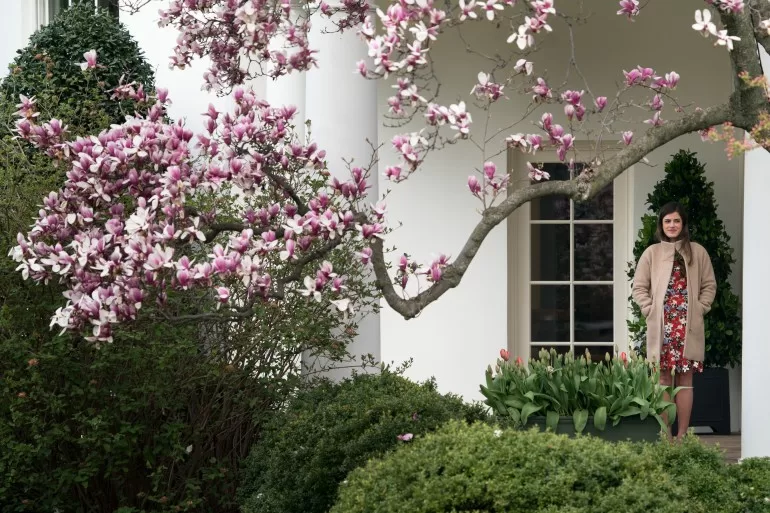Nevertheless, on Friday, the prosecution continued to call a line of witnesses, seeking to bolster its case that Trump, a former United States president, intentionally falsified business documents in an effort to influence the outcome of the 2016 election.
The documents in question pertain to an alleged hush-money payment made to the adult film star Stormy Daniels, who came forward with allegations that she and Trump had an affair.
Trump has denied any sexual relations with Daniels, but in 2016, his former lawyer Michael Cohen transferred $130,000 to Daniels to buy her silence.
Cheques to reimburse Cohen for the payment were classified as “legal expenses”, a label the prosecution says was designed to conceal their true purpose. Trump faces 34 felony counts of falsifying business records as a result.
Trump’s defence team, however, has denied any wrongdoing, saying that the former president merely aimed to avoid embarrassment for his family. It has also sought to have a mistrial declared in the case.
Here are five main takeaways from day 15 of the criminal trial, the first in history to feature a US president:
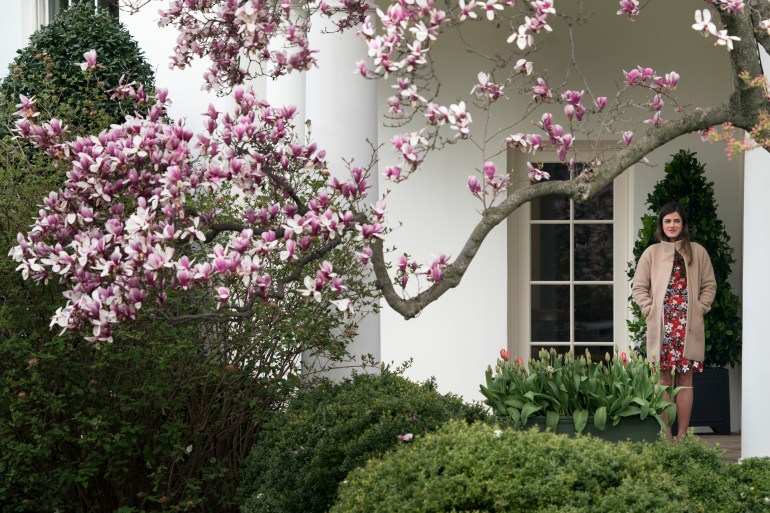
Trump aide returns to the witness hand
The first witness to take the stand on Friday was a familiar face: Madeleine Westerhout, who appeared a day earlier to testify to how Trump managed his affairs while in the White House.
A former White House aide who served as a personal assistant to Trump, Westerhout explained that the then-president would regularly receive envelopes from New York with cheques to sign.
But as cross-examination proceeded on Friday, Westerhout was pressed about the details she presented and whether she could have been aware of the precise business matters Trump was attending to.
Trump defence lawyer Susan Necheles also asked Westerhout about the amount of work the then-president juggled each day.
“Would you see him signing things without reviewing them?” Necheles asked at one point.
Westerhout responded, “Yes.” She also testified that Trump was worried about how rumours of an affair with Daniels would affect his family.
“My understanding was that he knew it would be hurtful to his family,” Westerhout said, echoing a centrepiece of the defence’s argument.
Trump’s lawyers have maintained that the former president did not seek to sway the 2016 election but rather to shield his wife and children from news that might cause them discomfort.
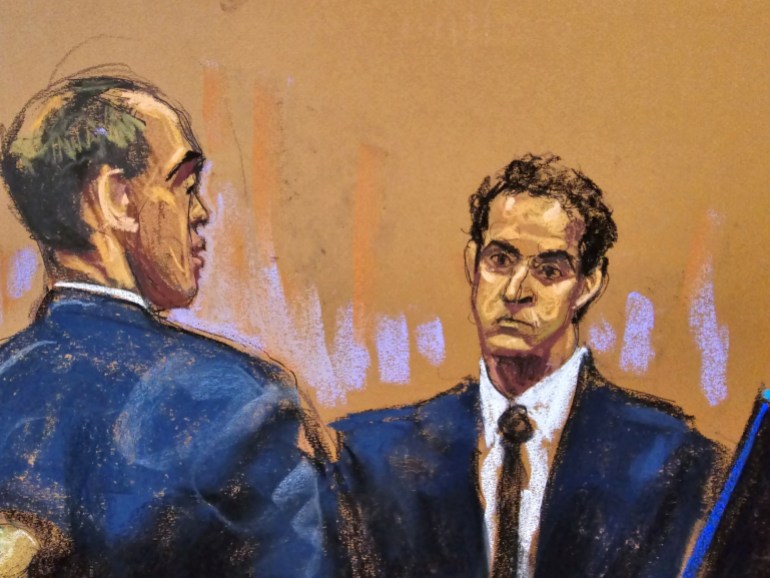
Technical witnesses fill out the day
Four more witnesses took the stand after Westerhout, testifying to technical aspects of the case and other evidence collected.
They included two representatives from major phone services: compliance analyst Daniel Dixon from AT&T and Jenne Tomalin from Verizon.
They briefly authenticated phone records, tracing communications between key figures in the trial, like Allen Weisselberg, the former chief financial officer for the Trump Organization.
The last two witnesses on Friday came from the Manhattan District Attorney’s Office: Georgia Longstreet — a familiar face on the stand — and Jaden Jarmel-Schneider, both paralegals.
Longstreet reviewed social media posts and text messages on behalf of the district attorney’s office.
During Friday’s testimony, she read aloud text messages Daniels’s manager Gina Rodriguez exchanged with an editor from the National Enquirer tabloid in 2016, before she accepted a hush-money payment from Trump’s then-lawyer Michael Cohen.
Jarmel-Schneider, meanwhile, spoke to the data collected from Cohen’s phone.
He discussed, for example, why a recorded conversation between Cohen and Trump — seemingly about a hush-money payment to Playboy model Karen McDougal — appeared to be so short: Cohen had another call coming in.
Prosecutors also used Jarmel-Schneider’s testimony as an opportunity to display on screen the 34 documents Trump allegedly falsified — the basis for the case.
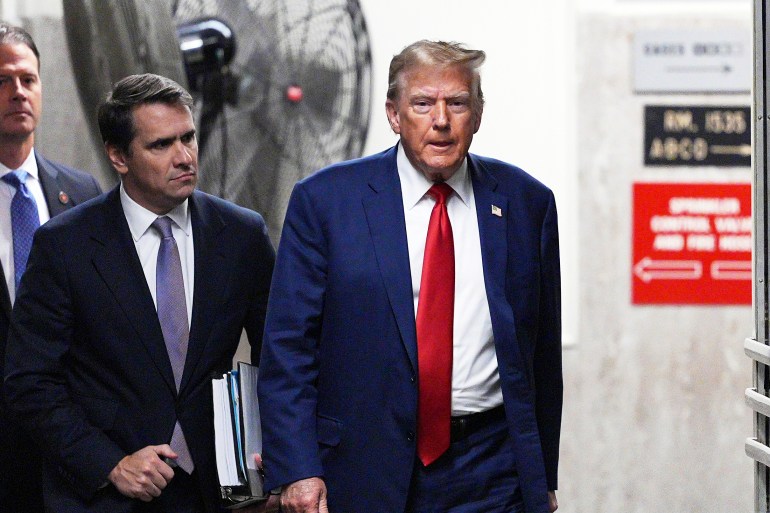
Larry King interview barred from evidence
During breaks in the witness testimony, the prosecution sought to convince Judge Juan Merchan to allow a 1999 interview between Trump and CNN personality Larry King into evidence.
The interview contained a segment where Trump professed to be familiar with campaign finance laws, something the prosecution hoped to use to buttress its case that he knew his actions were illegal.
But the defence argued that an interview from 1999 had little relevancy to a case hinged on events in 2016, by which time campaign finance laws had changed.
Judge Merchan ultimately sided with the defence. The 1999 interview, he said, was “too attenuated” by the long stretch of time between the events in question.
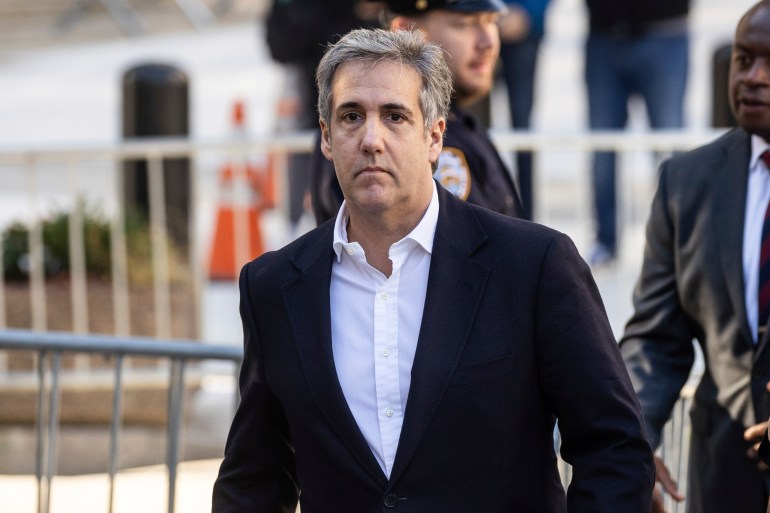
Cohen attacks Trump from TikTok
Another matter before the court was the question of Cohen’s presence on the social media platform TikTok.
Cohen is a key witness for the prosecution. He is expected to testify on Monday that Trump himself directed the hush-money payment to Daniels — and that the former president also ordered the subsequent falsification of the business records.
The defence, however, has sought to shift the blame away from Trump, saying that any criminal activity was Cohen’s fault instead.
Cohen and Trump have had a bitter relationship in recent years. Cohen left Trump’s employ in 2018, and the two men have exchanged lawsuits over legal fees and breached trust.
During the trial, Trump has been under a court-imposed gag order that bars him from speaking out against any witnesses, including Cohen. But he has violated that gag order multiple times, including to call Cohen a “liar” and share an article that labelled Cohen a “serial perjurer”.
But on Friday, Judge Merchan turned his attention to the comments Cohen himself was making on TikTok, attacking Trump.
The defence team had asked the judge to issue a separate gag order against Cohen, to stem his comments.
“It’s becoming a problem every single day that President Trump is not allowed to respond to this witness but this witness is allowed to continue to talk,” defence lawyer Todd Blanche said.
The prosecutors, however, argued they had little control over what Cohen said in his free time.
Judge Merchan, nevertheless, issued a stern warning. The prosecutors, he said, should tell Cohen “that the judge is asking him to refrain from making any more statements” about Trump.
“That comes from the bench,” he added.
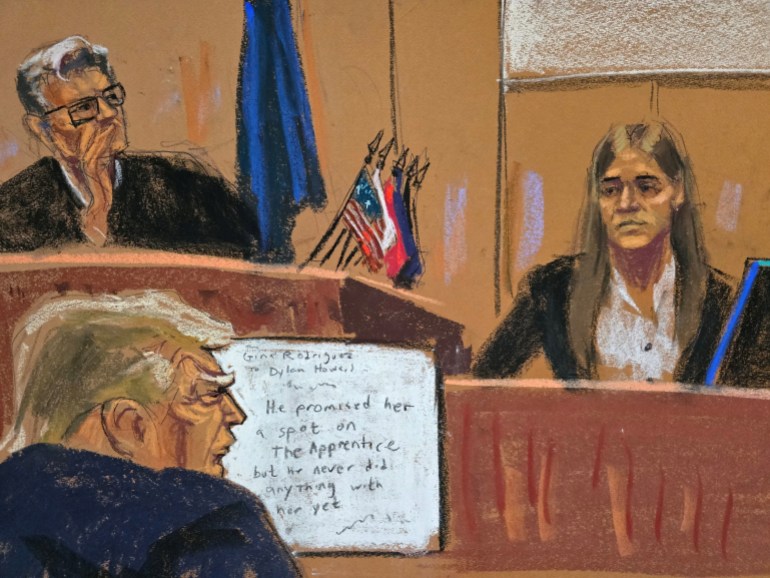
Two more prosecution witnesses to go
Friday’s court proceedings ended with an acknowledgement that the prosecution’s case is winding to a close.
Lawyer Joshua Steinglass told the court that the prosecution anticipated calling two more witnesses, then potentially resting its case.
“It’s entirely possible” that the prosecution could finish presenting evidence by next week, Steinglass explained.
The coming week is expected to be a short one, though: The court takes a midweek break every Wednesday, and on Friday, May 17, Trump requested the day off to attend his son Barron’s graduation.
With Friday’s hearing finally at an end, Trump exited the courtroom and spoke to the press, denouncing the prosecution’s case as a “scam”.
He complained that the court hinged on events that happened years ago, in 2016 — and that the charges landed in the middle of his current re-election campaign.
“It’s all fake. The whole case is fake,” he said as he left court for the day.
